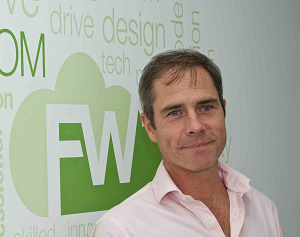
How has the easing of lockdown restrictions this summer impacted on demand for office space?
After the third lockdown we actually saw our footfall increase. I think people had had enough by lockdown three, so the narrative of it being really cool to work from home and never going back into the office changed to “I need to get out of the house”. So come April this year, across all of our coastal spaces, including Chichester and Worthing, we saw our biggest growth. By summer, footfall was back to pre-pandemic levels. And now our membership has increased across all our coastal spaces. Demand has gone up.
Tell us about the benefits of working at Freedom Works.
We position Freedom Works as more than a roof over your head: somewhere where you can work, but importantly somewhere you can collaborate. Nobody cares about that when they first turn up, but the reason they stay is because of the collaboration element. Our model is all about flexibility, so you can hot desk for an hour, or you can have an office for a year.
But the key USP is those coffee table conversations. We also do a member introduction service.
What are the advantages for freelancers (and workers who were previously commuting but can now work remotely) to be based in a co-working space, rather than at home?
Working from home is good if it works for you, but not everybody has a house that’s conducive to working. Fundamentally, it’s the social element. We are pack animals and innately people like being around others. Off the back of that is where business happens, where collaboration happens. You meet partners and friends for life in the workplace. You don’t get that if you’re working from home.
What are the benefits of having thriving co-working spaces for other businesses in towns and cities/local economies and the wider community?
I’d say there are three key benefits. One is it keeps homegrown talent at home – and there are spin off benefits from that: job creation and job safeguarding. Two, it keeps money within the local economy. So if you’ve got 100 co-workers in a space in a coastal town centre, and let’s say on average they spend £3 at lunch – that’s £1500 a week into the local retail economy. Thirdly, it encourages start-ups, and there’s a higher chance of success when you’re working around peers giving you support and encouragement. So it enables coastal communities to have a better chance for businesses to succeed, because it’s a better incubator space to grow.
What facilities/support do workers require? What’s important to them?
At the moment, Covid safe is priority number one. We’re very proactive on that. The other requirement is Wi-Fi. You can have the coolest place in town, but if the Wi-Fi doesn’t work, you might as well pack up and go home. And then the space needs to be somewhere people want to work. We invest in custom-built furniture and artwork. Aesthetically, it needs to be a place people feel proud about – and you shouldn’t have to go up to London or central Brighton to get that.
How important is digital infrastructure/connectivity and roll-out of gigabit fibre?
We deliver a gig in each of our sites. The other bit on the digital side is not just the connectivity, it’s about collaboration and knowledge sharing. In most of the spaces, there’ll be an accountant. Most of the accountants will use something like Xero accounting software, so they’ll talk to other members about what Xero does and how adopting digital elements can help them improve their processes.
We’re running a series of events in conjunction with West Sussex County Council about digital adoption and how to save money and time using digital, and it’s really simple to implement.
What are the benefits of working on the Sussex coast? What opportunities would encourage employees and employers to work across the coastal area/businesses looking to expand or relocate?
Quality of life. The pandemic has absolutely refocused the way a certain age group thinks about this. There’s still a demand for young people to go to London and live that life. We’ve seen a definite uplift in people of a certain experience and stage in their career, who want to see a better quality of life. Coastal Sussex – I don’t think there’s many places with its proximity to the airport and proximity to London. We’re so lucky where we live.
What type of businesses are attracted to co-working on the coastal strip?
It really is a range. There’s a digital and creative industry and obviously service-led industries. But we’ve recently onboarded a chiropractor, an office supplies business, a high-level data integration business, an advertising agency and a busy team of business developers who build specialist platforms for the betting industry. We’ve even got somebody who turns up every now and again because their mum lives in Worthing, they live in Hong Kong and they design theme parks in Asia.
Many existing small businesses and micro entrepreneurs are currently using collaborative workspace. To support their future growth, what space, support and expertise could these growing micro businesses need in the future?
There is definitely a shortfall of space in areas along the coast, where the infrastructure requires more employment space. The challenging thing is in these areas there’s lots of dormant retail units and buildings that are just not being used. It’s the unlocking of these buildings that could make a difference. Shoreham is a classic example: hundreds of new houses are being built, but there’s nowhere to work. So what are people going to do? They’re going to get on overcrowded trains or get in their cars on the A27 and they’re going to pollute. The “levelling up” isn’t happening.
How can office spaces be used more creatively in the future to benefit businesses and the wider community?
We’re not going back to segmenting, with the office space over there, the retail space somewhere else and another area for where you live. Communities are more homogenous now, and that’s the way people integrate. You don’t turn up at the office to sit down and type away, clock in, clock out – you turn up to meet your team, to collaborate, and sit around the table to work.
